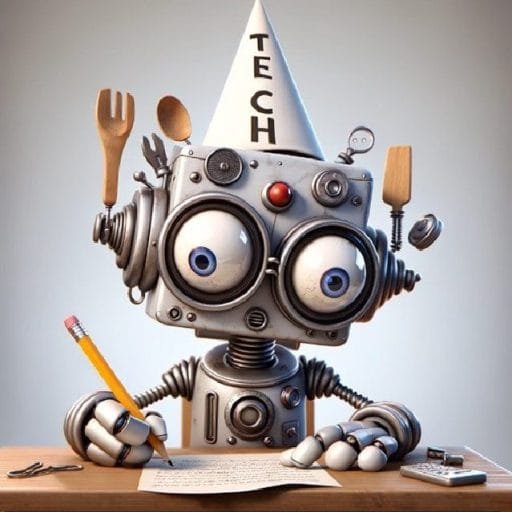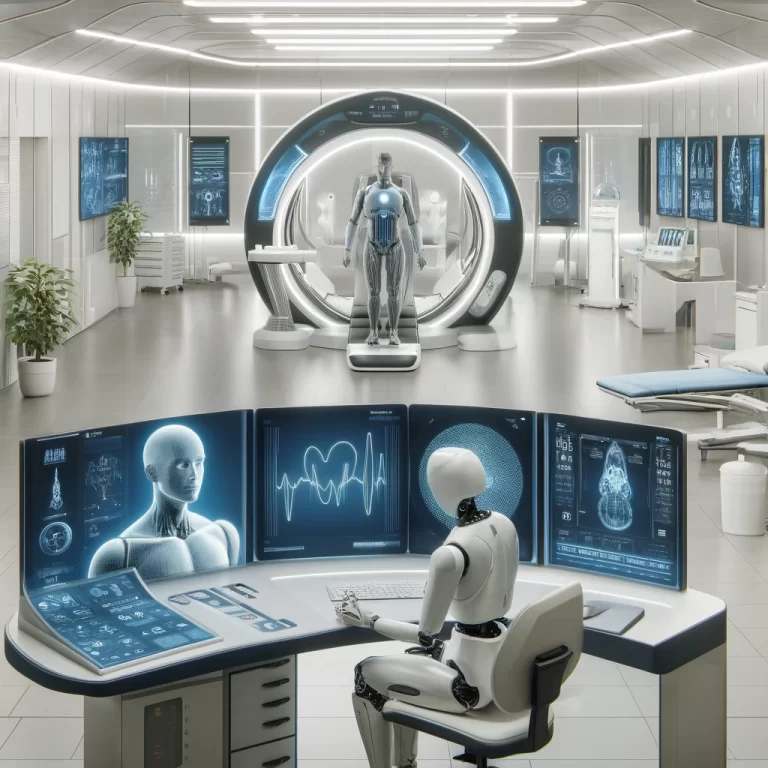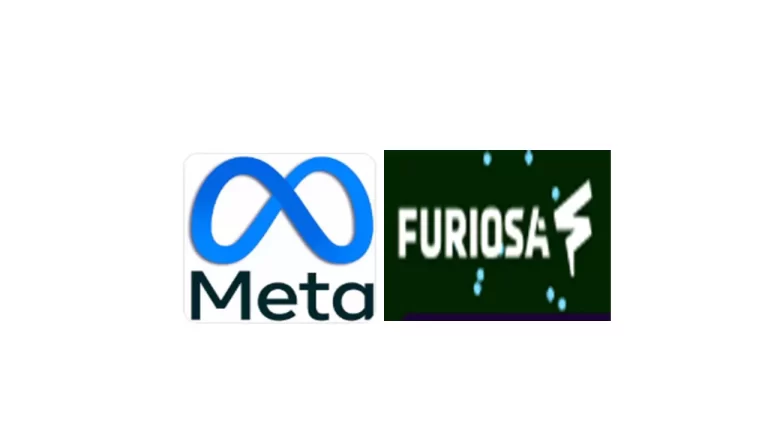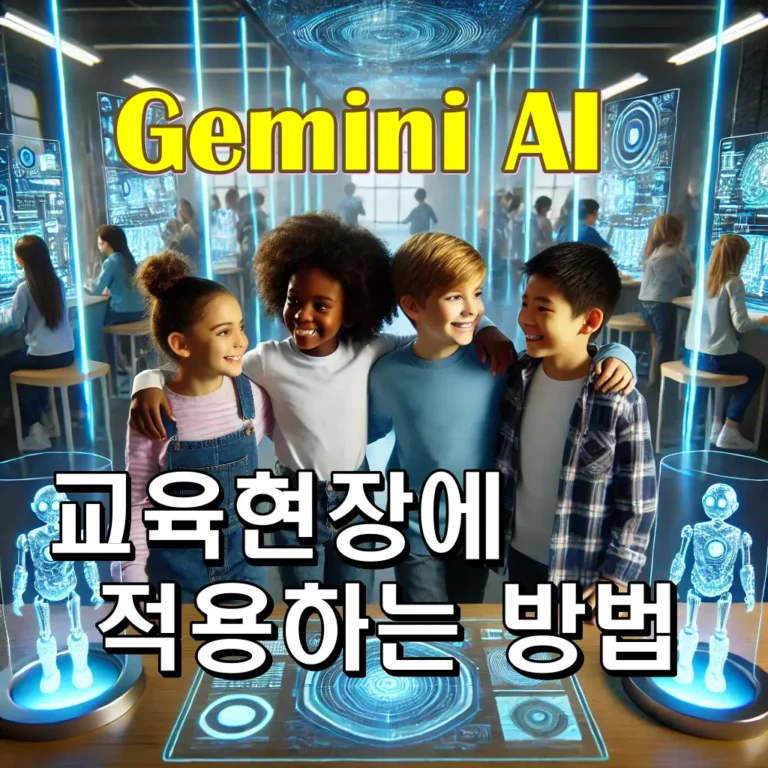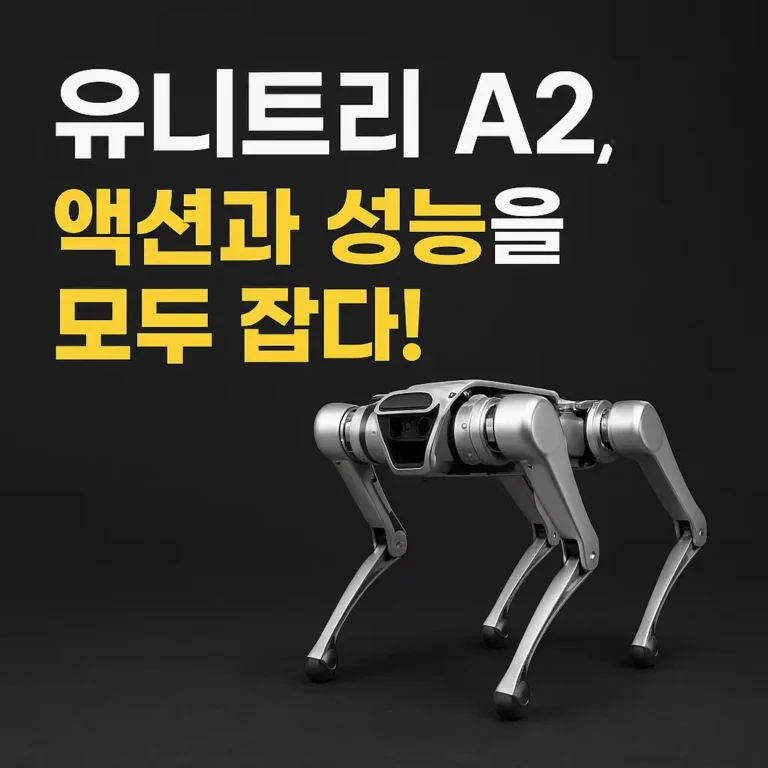OpenAI Certifications for AI Fluency: The Essential Path to Future-Proof Your Career
AI is no longer a future trend. It is already transforming how we work across every industry, from automating reports and analyzing data to writing proposals and assisting with customer service. The rise of generative AI, led by tools like ChatGPT, is pushing companies to rethink how teams operate and, more importantly, how they are trained.
The challenge is clear. Most workers were never taught how to work with AI, and traditional education is not keeping pace with the speed of technological change. That is where OpenAI Certifications come in.
These certifications are designed to give individuals practical AI skills they can use in the workplace. Whether you work in marketing, retail, education, logistics, or operations, OpenAI is offering a new kind of credential focused on real-world fluency, not academic theory.
With support from major employers like Walmart, global firms like BCG and Accenture, and government-backed workforce programs, OpenAI Certifications are becoming a new standard for AI readiness in the modern workplace.
In this blog, we will explore what these certifications include, how they connect to OpenAI’s new AI-powered jobs platform, and why this initiative is becoming one of the most important workforce strategies of this decade.
1. What Are OpenAI Certifications for AI Fluency?
OpenAI Certifications for AI Fluency are designed to validate an individual’s ability to understand, apply, and collaborate with AI tools in practical, work-related contexts. Unlike traditional IT certifications that focus on coding, engineering, or system architecture, these credentials are built for a broader audience — from corporate employees to frontline workers — who need to become AI-capable, not AI developers.
At their core, the certifications aim to answer one question:
Can you use AI to make smarter, faster, and more effective decisions in your job?
These certifications are delivered through ChatGPT itself, making the learning process highly interactive. Users complete structured learning modules, test their understanding through embedded assessments, and earn certifications that reflect their level of AI fluency. The content ranges from basic tasks like summarizing reports and writing emails using AI, to more advanced topics like prompt engineering, workflow automation, and ethical AI usage.
Key Features of the Program:
- Multi-level certification tracks, from beginner to advanced.
- Integrated within ChatGPT, with hands-on, real-time learning.
- Built for accessibility, requiring no prior technical background.
- Backed by employers, with use cases tailored for retail, healthcare, education, and more.
Unlike generalized courses on platforms like Coursera or Udemy, OpenAI’s approach is tightly coupled with its own tools and reflects real-world usage patterns. It teaches not just what AI is, but how to actually use it to get work done.
This is not just training — it’s credentialing for the age of intelligent software.
To make the certification structure easier to understand, here is a visual overview of the different types of OpenAI Certifications for AI Fluency. Each track is designed to meet the needs of learners at various levels and across diverse industries.
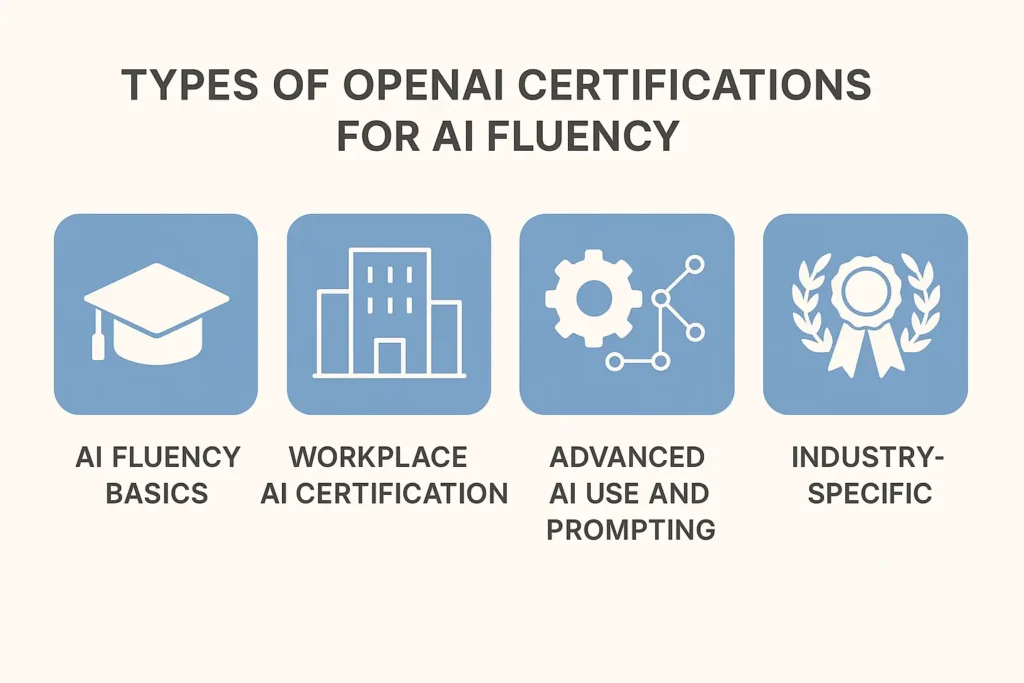
2. Inside the OpenAI Certifications Experience
What sets OpenAI Certifications apart is not just the content, but the way the learning experience is delivered. This is not a traditional online course or a passive video series. The entire certification process happens inside ChatGPT, through a guided, interactive experience that mimics real workplace tasks.
How OpenAI Certifications Work
The journey begins when a user activates learning mode within ChatGPT. From there, OpenAI Certifications follow a structured path that includes:
- Self-paced modules tailored to industry use cases
- Practical exercises that simulate real on-the-job scenarios
- Built-in quizzes, reflections, and feedback loops
- A final assessment that validates applied AI fluency
All of this is designed to be done in context — not in theory. Users learn by doing, solving the kinds of challenges they would actually face in their jobs using AI tools like ChatGPT.
The result is a skills-based credential that goes beyond awareness. It proves a person’s ability to use AI tools productively and responsibly in real time.
Certification Tracks and Levels
OpenAI has signaled plans to offer multiple levels of certification, including:
- AI Fluency Basics: Foundational knowledge for beginners
- Workplace AI Certification: For professionals using AI in job-specific workflows
- Advanced AI Use and Prompting: For power users and team leads
- Industry-specific tracks: Tailored for retail, education, logistics, and more
Each certification reflects a practical command of AI tools — not just technical theory — which makes them accessible and useful across roles.
Why the Format Matters
The value of OpenAI Certifications lies in their relevance. Most workers do not need to learn how to build AI systems. They need to know how to use AI to do their current jobs more effectively. By embedding training directly into ChatGPT, OpenAI eliminates the gap between learning and application.
This approach makes the certifications:
- Faster to complete
- More personalized
- Directly aligned with AI-integrated work environments
Whether you are writing marketing copy, analyzing customer feedback, or summarizing legal documents, OpenAI Certifications teach you how to do it faster and smarter with AI.
3. The Role of OpenAI Academy
Before launching its certification program, OpenAI laid the groundwork through an initiative called OpenAI Academy. This learning platform provides the foundational resources that support the OpenAI Certifications experience.
OpenAI Academy is a self-paced environment where users can explore how AI works in real-world contexts. It serves as a bridge between curiosity and credentialing. The Academy helps users become comfortable with AI tools before stepping into the formal certification process.
What OpenAI Academy Offers
The Academy provides access to:
- Interactive lessons on AI concepts and practical applications
- Use case examples across business, education, and service sectors
- Built-in practice prompts that simulate real work tasks
- Guidance on how to think critically and ethically when using AI
These resources are especially valuable for users who are not coming from technical backgrounds. It lowers the barrier to entry, helping more people prepare for OpenAI Certifications without needing prior experience in programming or data science.
How It Connects to OpenAI Certifications
The learning experience in OpenAI Academy is directly tied to the certification path. In fact, many of the modules in the Academy overlap with or lead into the official OpenAI Certifications tracks. This integration ensures that learners are building relevant skills from the very beginning.
Some of the ways the Academy supports the certification process include:
- Letting users build foundational fluency before taking assessments
- Recommending certification levels based on learner progress
- Providing a preview of the types of tasks required for certification
- Helping users identify where AI can support their specific job roles
Expanding Access to AI Fluency
By offering open access to OpenAI Academy, OpenAI is creating a low-friction on-ramp to AI fluency. This gives more people a chance to engage with the tools, explore their potential, and then pursue formal OpenAI Certifications once they are ready.
It is a model built for scale and inclusion. Anyone with internet access can begin learning at their own pace, and move toward earning credentials that are already gaining recognition across industries.
4. Strategic Partners Driving the Initiative
The rapid expansion of OpenAI Certifications is made possible through partnerships with some of the largest employers, consulting firms, and government organizations in the country. These partners are not just promoting the certifications. They are actively shaping how they are delivered, applied, and scaled across the workforce.
By working with high-impact organizations, OpenAI is positioning its certification program as a practical, job-ready credential that fits into real workplace environments. These partnerships help ensure that OpenAI Certifications are trusted, recognized, and aligned with the needs of both employers and employees.
Walmart: Certification at Scale
Walmart, the largest private employer in the United States, has committed to offering OpenAI Certifications to over 1.6 million associates. The goal is to help workers at all levels develop AI fluency and apply those skills in their day-to-day roles.
This partnership shows that AI fluency is not just for corporate offices or tech teams. It is relevant on the retail floor, in the stockroom, and in every department where efficiency and communication matter.
BCG and Accenture: Industry Expertise and Implementation
Boston Consulting Group (BCG) and Accenture are helping OpenAI develop certification content that is tailored for enterprise use. They are also piloting the OpenAI Certifications within their own organizations and recommending strategies for broader client adoption.
These firms bring credibility, reach, and insight into how certifications can be adapted across industries including finance, healthcare, logistics, and government services.
Public Sector and Industry Collaborations
OpenAI is also working with companies like John Deere and organizations like Indeed to integrate OpenAI Certifications into workforce development and recruiting. Meanwhile, states like Texas and Delaware are using the certification program in pilot programs that aim to reskill public sector employees.
These collaborations reinforce the idea that OpenAI Certifications are not just a tech product. They are part of a growing movement to prepare the broader workforce for an AI-enabled economy.
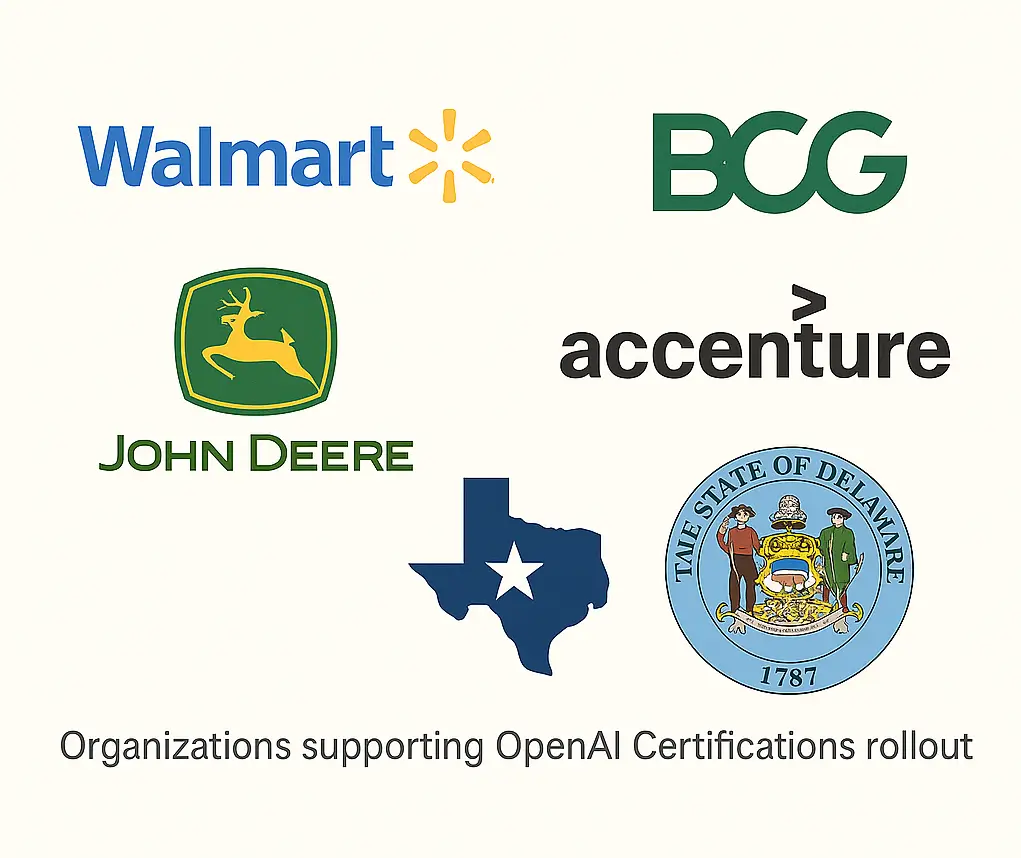
5. The Goal: 10 Million Certified by 2030
OpenAI has set an ambitious target. The company aims to issue OpenAI Certifications to 10 million Americans by the year 2030. This goal reflects both the urgency of building an AI-literate workforce and the growing demand for people who can work effectively with AI in practical settings.
This is not just a symbolic milestone. It is a strategic response to a rapidly changing labor market where digital tools are becoming essential across nearly every job function. OpenAI Certifications offer a fast, accessible way for workers to gain meaningful credentials that align with the needs of today’s economy.
Meeting the Moment
Labor experts estimate that tens of millions of jobs in the U.S. will be reshaped by AI over the next decade. Some jobs will be lost. Many more will evolve. Workers will need new skills to remain competitive, and businesses will need a clear way to identify who is truly ready to operate in AI-integrated environments.
By scaling OpenAI Certifications to millions of people, OpenAI is creating a system where workers can upgrade their skills and prove their value without going back to school or completing lengthy degrees.
Policy Alignment and Government Support
This effort is not happening in isolation. The push for OpenAI Certifications is aligned with U.S. government priorities around workforce development and AI literacy. OpenAI leadership has participated in national roundtables and public-private discussions about how to make AI education widely accessible.
Federal, state, and local governments are exploring ways to integrate these certifications into public workforce programs, training grants, and employer incentives. This creates a direct link between national policy and individual career growth.
OpenAI Certifications are designed to scale. Whether you are in a major city or a rural town, whether you work for a Fortune 500 company or a local government office, the opportunity to build AI fluency is within reach. This is not just a technology initiative. It is a workforce transformation strategy with a clear, measurable goal.
6. OpenAI’s Jobs Platform: The Next LinkedIn?
To support the impact of OpenAI Certifications, the company is building something bigger than just a learning tool. OpenAI is developing a dedicated AI-powered jobs platform that connects certified users with real employment opportunities. This platform is designed to close the loop between skill-building and career advancement.
The idea is simple. Once someone earns one of the OpenAI Certifications, they should be able to apply those skills immediately in the job market. Instead of leaving learners to navigate job boards on their own, OpenAI is creating a system where certification leads directly to opportunity.
A Skills-First Hiring Experience
Unlike traditional career platforms that rely on resumes and job titles, OpenAI’s approach is centered around demonstrated capability. The platform will prioritize users who have completed OpenAI Certifications, helping employers find candidates with proven AI fluency.
It is expected to include:
- Personalized job matching based on certification level
- Dedicated tracks for small businesses and public sector roles
- Integration within ChatGPT to keep the experience seamless from learning to hiring
This creates a full ecosystem where a user can train, get certified, and be discovered by employers — all within one connected platform.
Changing How Employers Hire
OpenAI Certifications are also changing how companies think about hiring. Instead of filtering applicants by degree or years of experience, employers can now look for credentials that prove a person knows how to use AI in real work settings.
For small businesses and local governments that do not have large HR teams or training budgets, this platform will offer direct access to certified talent. For larger companies, it can support internal promotions, lateral moves, and talent development pipelines.
By connecting OpenAI Certifications directly to hiring outcomes, OpenAI is moving from education into employment. This shift supports a more inclusive, skills-based job market where anyone can level up, prove their value, and move forward — regardless of their background.
7. How OpenAI Certifications Are Shaping the Future of Work
The introduction of OpenAI Certifications is changing more than just how people learn. It is reshaping how companies hire, how workers grow their careers, and how the economy defines value in a rapidly evolving AI-driven environment.
This shift marks a move from traditional degrees and outdated training methods to skill-first credentials that reflect real capability with modern tools. As AI continues to expand into every sector, having the ability to work with it is no longer optional. It is becoming a core requirement across roles and industries.
Skills Over Status
OpenAI Certifications are designed to highlight what a person can do with AI, not just what they studied or where they went to school. This creates new opportunities for people who want to transition careers, upskill quickly, or compete in a job market that increasingly values hands-on experience.
Whether it is a customer support agent using ChatGPT to manage service requests, a teacher generating personalized lesson plans, or a project manager automating workflows, OpenAI Certifications make those skills visible and credible.
A New Hiring Mindset
Employers are already adjusting their expectations. Instead of screening for credentials that may not reflect actual AI fluency, hiring teams can now look for OpenAI Certifications that demonstrate job-ready skills.
This shift supports:
- Internal mobility and promotions
- Lateral moves into tech-enhanced roles
- Greater inclusion for workers without traditional backgrounds
Future-Proofing the Workforce
Job titles and responsibilities are changing fast. Roles like AI operations coordinator, prompt strategist, and digital workflow analyst are becoming more common. None of these require advanced degrees, but all require strong AI fluency.
OpenAI Certifications provide a way to validate that fluency in a consistent, scalable way. They also help employers keep pace with technology without constantly reinventing their training programs.
The future of work is not just about automation. It is about amplifying human potential through AI. With OpenAI Certifications, individuals can take control of that future, and organizations can build teams that are ready for what comes next.
8. OpenAI vs LinkedIn: Competition or Collision
OpenAI’s move into the hiring space brings it closer to a head-on clash with LinkedIn, the most dominant platform for professional networking and job recruitment. What makes this more complicated is that Microsoft owns LinkedIn and is also OpenAI’s largest investor and infrastructure partner.
This creates a strange dynamic. On one hand, OpenAI and Microsoft are working together to scale AI products through Azure, Office, and enterprise integrations. On the other hand, OpenAI is launching a jobs and credentialing platform that overlaps with Microsoft’s crown jewel in the professional world.
Different Starting Points, Same End Goal
LinkedIn is built around resumes, connections, and career timelines. It has spent years refining its tools for recruiters, HR teams, and job seekers. OpenAI, by contrast, is starting from a skills-first perspective — using certifications and AI fluency as the foundation for career discovery and talent matching.
Where LinkedIn asks who you know, OpenAI is asking what you can do.
And while both platforms may eventually offer similar services like job listings, skill badges, and hiring tools, the approach matters. OpenAI is trying to shorten the distance between learning and earning, building a loop where someone can learn a skill, get certified, and apply for work — all in one place.
Is a Collision Inevitable?
It depends on how the two entities position themselves moving forward. Microsoft may try to integrate OpenAI’s certifications into LinkedIn. Or it may choose to keep them separate and see how each platform performs. Either way, users stand to benefit.
More competition in this space means:
- Better tools for learning and job discovery
- More value placed on skill-based hiring
- Greater innovation in how careers are built in an AI-first economy
What’s clear is that OpenAI is no longer just a research lab or API provider. It is now building the infrastructure for how people learn, prove, and use their AI skills in the real world.
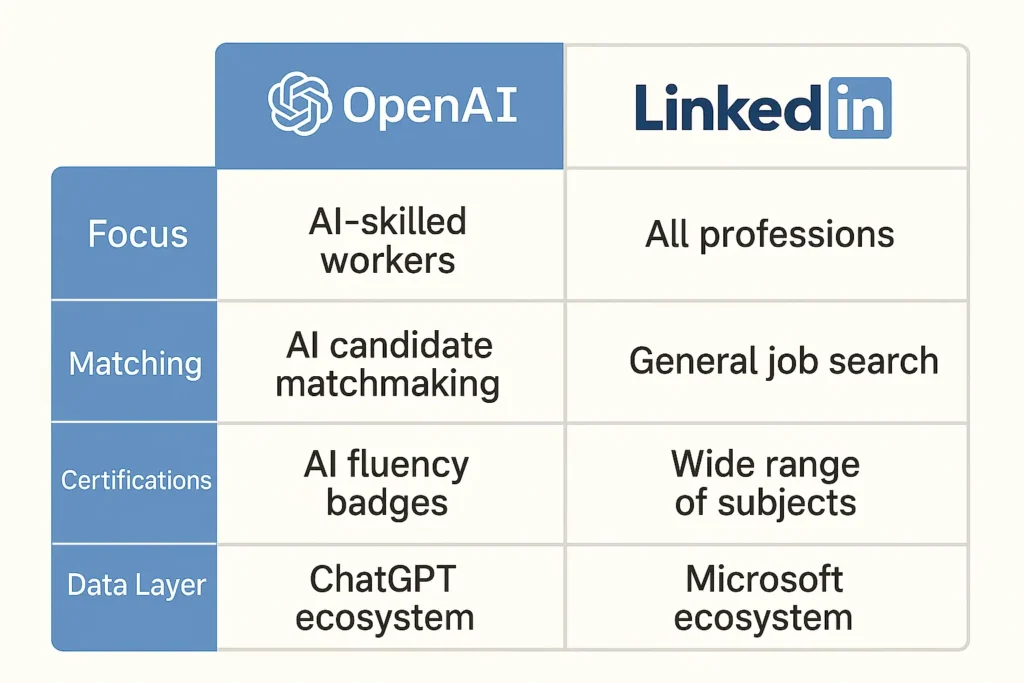
9. Final Thoughts: Should You Get Certified?
If you are wondering whether it is worth getting certified in AI fluency, the answer depends on one question:
Do you want to stay relevant in a workforce that is rapidly adapting to AI?
You do not need to be a software engineer or data scientist to benefit from tools like ChatGPT. What you do need is confidence in how to use AI to make your work faster, smarter, and more valuable. That is exactly what the OpenAI Certifications for AI Fluency are designed to offer.
Who Should Consider It?
- Professionals looking to future-proof their careers with AI know-how
- Employers who want their teams to work efficiently with AI tools
- Job seekers aiming to stand out with skills that hiring managers now expect
- Non-technical workers who want to build digital fluency without going back to school
Whether you work in retail, healthcare, education, marketing, logistics, or public service, AI fluency is no longer optional. It is becoming a core skill, just like Excel was in the early 2000s.
What’s Next?
OpenAI is building a system where learning, certification, and hiring all live in the same ecosystem. That means:
- You learn directly inside ChatGPT
- You earn a recognized credential
- You apply for jobs through OpenAI’s upcoming hiring platform
This is more than a course. It is a career pathway.
Get Ahead of the Curve
If you’re already using ChatGPT or thinking about how AI might change your field, now is the time to take the next step. Explore OpenAI Academy, start the learning track, and see what AI fluency can do for your role — and your future.
Because in the age of AI, the most valuable workers will not be the ones who fear the tools, but the ones who know how to use them well.
Meta Keywords:
OpenAI Certifications, AI fluency certification, OpenAI jobs platform, AI workforce training, AI skills for professionals, AI upskilling programs, ChatGPT certification, OpenAI Academy, AI fluency in the workplace, future of work with AI, AI literacy programs, skill-based hiring, OpenAI career training, AI education, AI skills certification, 오픈AI 자격증, AI 활용 능력 자격증, 오픈AI 채용 플랫폼, AI 직무 교육, 전문가용 AI 기술, AI 역량 향상 프로그램, 챗GPT 자격증, 오픈AI 아카데미, 직장 내 AI 활용, AI 기반 미래 일자리, AI 리터러시 프로그램, 역량 기반 채용, 오픈AI 경력 훈련, AI 교육, AI 기술 자격증
